|
|
|
Sort Order |
|
|
|
Items / Page
|
|
|
|
|
|
|
| Srl | Item |
| 1 |
ID:
129089
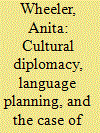

|
|
|
|
|
| Publication |
2014.
|
| Summary/Abstract |
As China's economic and political presence in Africa increases, so does the need for its government to maintain a favorable image with African publics. Borrowing theories of soft power diplomacy and language planning, this paper analyzes, from the perspectives of African and Chinese policymakers, the impact of the Confucius Institutes on higher education in Africa and its intersections with language planning and cultural diplomacy. An empirical case study at the University of Nairobi Confucius Institute shows that policymakers and administrators anticipate that a competent group of Kenyans with Mandarin language skills will be able to engage with Chinese people and Chinese-owned companies on the ground in Kenya. However, Chinese diplomats are more concerned with China's image and achieving its political and economic interests in Kenya than with effective cultural exchange and language instruction.
|
|
|
|
|
|
|
|
|
|
|
|
|
|
|
|
| 2 |
ID:
129096


|
|
|
|
|
| Publication |
2014.
|
| Summary/Abstract |
The categorization of displaced people is grounded in criteria enshrined by international and regional conventions as well as receiving states' asylum and immigration policies. However, drawing distinctions between displaced people remains a controversial issue because the causes of displacement are more diverse than the categories assigned. Whilst various categories confer different rights and entitlement, the forcibly displaced are often obliged to aspire to particular identities driven by their resettlement livelihood objectives. This paper is based on a study carried out in Brazzaville, Republic of Congo and Newcastle upon Tyne, United Kingdom. The paper argues that the institutional and policy environments in the locations where resettlement is sought determine the way displaced people identify themselves in displacement and how they appraise their circumstances and their consequent adaptive livelihood reconstruction strategies. Furthermore, it is shown here that formalized displacement categorization adds complexity to the way displaced people must deal with their circumstances and negatively impacts on livelihood adaptation. Whilst categorization may serve perceived institutional needs, this study finds that displaced people's self-identification makes them resilient and enables survivability.
|
|
|
|
|
|
|
|
|
|
|
|
|
|
|
|
| 3 |
ID:
129087
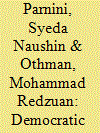

|
|
|
|
|
| Publication |
2014.
|
| Summary/Abstract |
In recent years efforts have been made to improve governance by ensuring institutional performance and policing for greater transparency to sustain liberal democracy in Bangladesh and elsewhere. Since gaining independence in 1971, The People's Republic of Bangladesh has been driven by internal power struggles and economic chaos, while attempting to develop a democratic society. A predominately Islamic country, Bangladesh's representative government is battling poverty and rampant corruption. Although this study appreciates what Bangladesh has achieved so far, it seeks to deviate from the general trend that romanticizes Bangladesh's democracy and its recent connection with new governance parameters. This study attempts to identify some of the major paradoxes that Bangladesh's democracy is faced with. All these factors will be analyzed in the context of a contemporary notion of governance and democracy in Bangladesh.
|
|
|
|
|
|
|
|
|
|
|
|
|
|
|
|
| 4 |
ID:
129451
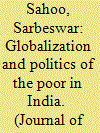

|
|
|
|
|
| Publication |
2014.
|
| Summary/Abstract |
The paper addresses two basic questions in the globalization literature: (1) is globalization a threat or an opportunity? And (2) how far does market deepening actually encourage genuine substantive democracy in the world? Many scholars have argued that globalization has resulted in increasing inequality and marginalization of the poor, which is not conducive for democracy. Drawing on the case of India, this paper, however, argues that the rolling back of the welfare state and the demise of developmentalism led to the mobilization of the masses against the elitist and exploitative agenda of globalization. As a result, a counter-hegemonic vibrant civil society has emerged, which challenges the hegemony of the elites and channels the empowerment agenda of the subaltern groups. This new politics of the subaltern is grounded on the idea of social justice and citizenship rights, which is redefining the nature of the Indian state and democracy.
|
|
|
|
|
|
|
|
|
|
|
|
|
|
|
|
| 5 |
ID:
129095
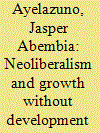

|
|
|
|
|
| Publication |
2014.
|
| Summary/Abstract |
Ghana witnessed decent economic growth in the last three decades of implementing neoliberal policy prescriptions. Indeed, this growth promoted it to a low middle income country in 2010. Paradoxically, the wellbeing of most Ghanaians in the subaltern classes has not improved significantly, and they still suffer grinding poverty. How to understand this paradox of growth without development? This paper argues that the failure of Ghana to diversify its economy into industrialization, particularly manufacturing, explains the paradox. With its relatively good politics and open economy, the Ghanaian state should spearhead industrialization, as South Korea and Malaysia did, by supporting selective manufacturing firms with capital, technology, and protective tariffs.
|
|
|
|
|
|
|
|
|
|
|
|
|
|
|
|
| 6 |
ID:
129093
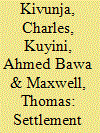

|
|
|
|
|
| Publication |
2014.
|
| Summary/Abstract |
Cast in the framework of social capital theory, this research used case studies to investigate the settlement experiences of African migrants in Armidale, Tamworth and Coffs Harbour in Australia. Analysis of individual (n = 29) and one focus group interview data revealed that most migrants expressed some satisfaction with service provision in the areas of initial settlement support and the work of local community organizations. Problems still remained with regard to employment, family reunion and dealing with changes in family relations. The study concludes that there is a need to educate African migrants on mainstream Australian culture in order to enhance the migrants' capacity to build social capital. Local governments need to make specific provisions within their policies, focusing on the settlement of migrants to address some of the gaps in services.
|
|
|
|
|
|
|
|
|
|
|
|
|
|
|
|
| 7 |
ID:
129097
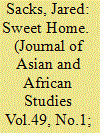

|
|
|
|
|
| Publication |
2014.
|
| Summary/Abstract |
For much of the winter of 2012, communities in shack settlements across Cape Town took to the streets in some of the most active civil disobedience protests since 1994. Knowing that the mainstream political terrain often seeks to obfuscate and mislead the public about the true nature of these protests, this paper investigates claims by politicians from the Democratic Alliance (DA) that these protests were being coordinated by the Youth League of the African National Congress (ANCYL). These big political players moralize the debate, shifting the focus from the perfectly legitimate issues of service delivery and demands for meaningful engagement. Speaking directly to community members of Sweet Home Farm, an informal settlement of 15,000 people in the Philippi area, revealed a yawning chasm between what official players are saying about Sweet Home and the actual realities on the ground.
|
|
|
|
|
|
|
|
|
|
|
|
|
|
|
|
| 8 |
ID:
129082


|
|
|
|
|
| Publication |
2014.
|
| Summary/Abstract |
In this article I explore how the post-9/11 neo-liberal climate of globalization has served as the context within which is articulated masculinist and orientalist forms of nuclear discourses between India and the United States (US). To this extent, I draw from feminist international relations (IR), that security is a gendered phenomenon, to explore the linkages between masculinities and nuclear weapons as underpinning the nuclear security discourses between India and the US. Yet considering issues of international hierarchy and power relations between India and the US, I also draw from Edward Said's Orientalism to explore how assumptions of orientalism are also sustained in these masculinist nuclear discourses. My contribution lies in enriching feminist IR with a post-colonial angle by suggesting that feminist IR continue to engage with post-colonial feminist perspectives to comprehend the masculinist and orientalist forms of identity politics that underpin security relations/discourses between Western and post-colonial states.
|
|
|
|
|
|
|
|
|
|
|
|
|
|
|
|
|
|
|
|
|